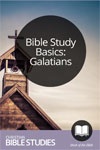Disobedience to God's Word needs no encouragement; it's abundant enough, thank you. Yet without intending to, local churches frequently establish patterns that hinder actually doing the Word.
The formula is deceptively simple: Expose people to more biblical material than they can digest, do it in a context separated from real life, and emphasize Bible facts, not personal acts.
Imagine the typical situation of a new believer: He attends a Sunday morning Bible class studying Paul's three missionary journeys. Full of excitement from Dr. Luke's dynamic account of worldwide salvation in Jesus (but with no time to assimilate it), he enters the sanctuary for worship. The sermon is "Speaking Covenant: The Ultimate Language of Love," part of a series on Hosea. The new believer is impressed with the need for covenant love in both his relationship with God and with his spouse.
On the way out, he picks up the current copy of Daily Light. Using this or some other excellent plan for daily Bible study, he'll spend six brief sessions in Psalms.
If he's really serious, he'll also attend a midweek Bible study/prayer group, where the parables are being taught. But they won't explode in his mind either, because he's still half-thinking about what the TV evangelist said last night.
He's effectively been inoculated.
In the Great Commission, Jesus called not for teaching the Word but "teaching them to obey." Doing, not hearing, biblical truth is the measure of biblical faith. When we encourage gathering information or even inspiration without learning to live it, we unwittingly encourage disobedience. We erect barriers against the Holy Spirit.
Kierkegaard once said, "The moment I take Christianity as a doctrine and so indulge my cleverness or profundity or eloquence or imaginative powers in depicting it, people are very pleased; I am looked upon as a serious Christian. The moment I begin to express existentially what I say, and consequently bring Christianity into reality, it is just as though I had exploded existence—the scandal is there at once" (Journals, 343).
In an effort to bring Christianity into reality, I began 20 years ago to explore the concept of an integrated congregational curriculum.
I was pastoring Temple Baptist Church in inner-city Montreal, a multicultural fellowship where I was challenged to communicate God's Word to five diverse ethnic groups.
We wrote a lectionary of daily readings that led us systematically through whole books of the Bible. During the week, our neighborhood meetings in homes of church members would discuss three or four simple questions we had copied to help them apply the readings of the week. Then on Sunday I preached from the study portion assigned for that week. The community walked with me through a passage they'd already studied.
From that experience I learned the principle of reinforced learning: People are more likely to "do the doctrine" when they meet that same word in more than one environment.
Ten years later, at West Point Grey Baptist Church in Vancouver, British Columbia, the integrated approach took a quantum leap forward. I discovered that a lasting lesson is learned when people find it for themselves.
"Standing at the bus stop the other day," one of the older sisters confessed to me, "I tried to remember something from all the sermons I've heard over 30 years. My mind went totally blank. But I was flooded with gratitude when I recalled the things I'd discovered for myself in the Scriptures."
We designed a curriculum that aimed at learning rather than teaching. We'd spend eleven weeks, for instance, in Ephesians. Besides the daily Bible readings, we would offer a weekly personal Bible study section and a group experience.
The personal study was a series of inductive questions. Each person would observe (what does it say?), interpret (what does it mean?), and apply (what does it mean to me?). The notes we provided gave a minimum of information—only what was needed to make sense of the text.
The group study each week took the same passage and applied it to corporate life. Discussion questions helped the groups make fresh discoveries as needs, gifts, and concerns surfaced from exposure to the Word. An optional group relational exercise attempted to apply the Scripture to relationships within the group. Relationships, we found, are not only an area of application but of illumination.
For example, one group genuinely experienced the truth that "parts of the body which seem to be weaker are indispensable, and those … we think less honorable we invest with the greater honor." They spent an entire evening focusing on one person at a time and answering the question, "How has this person been used by God to minister to this group or to individuals?" They were amazed to find out how many ways seemingly awkward personalities had been essential to the health of the group.
The small groups became examples of faith on display, living demonstrations of biblical truth.
What a privilege on Sunday to teach people who had read the passage, discussed it among themselves, and encountered it corporately. Not once in 20 years has anyone complained of repetition of the same text. The most common criticism has been that we were moving too quickly through the Scripture.
Often the Sunday sermon was based on something that surfaced in our Tuesday small group. No longer the lonely prophet descending from the mountain to deliver the Sunday message, I was now a fellow learner in the camp, sharing what God was teaching us all. We learned the meaning of, "You do not need anyone to teach you." It doesn't mean teaching elders are unnecessary. Far from threatening my position, it actually enhanced it through a corporate anointing of the Spirit.
Thus at West Point Grey, I learned the principle of discovery learning: People will integrate into their lives what they've discovered for themselves.
Now here at Marineview Chapel in Vancouver, I've divested myself of an additional clerical prerogative: I no longer write the curriculum myself. A group of eight or nine, selected by the elders, meet to discuss the upcoming texts, identifying the major themes we need to confront, and then divide up the writing assignments. They meet again to critique one another's work before one of the elders edits and takes the material to the printer. Thus, our curricula are fully homegrown, uniquely aimed, and rarely suitable for other congregations without radical editing.
Each year the elders select the learning plan, which includes at least one Old Testament book, one New Testament book, and a contemporary topic such as economic lifestyle, spiritual formation, public discipleship, or something current in the pilgrimage of our church.
We plan one- or two- week gaps between series to give people a break from the daily readings, give the groups a chance to do something other than Bible study, and allow the elders to preach in response to some immediate need. This helps us avoid over programming and allows us to scratch where people are itching.
For instance, when a group at Marineview got excited about radical community, the elders, instead of ignoring them as a threatening irritation, welcomed this as a learning moment. We were in the midst of trying to decide whether to spend $3 million for a bigger building or reorganize somehow to make do with what we had. The group was invited to prepare a topical study for the whole church to investigate scriptural principles of congregational life. The eight-week series helped shape our eventual decision to divide the congregation into three working communities, each with its own meeting time on Sunday, its own cluster of elders, and its own network of house groups. Not only were we better able to handle 600 people in our small building, but fresh leadership and new gifts emerged.
Occasionally we provide a section of family studies for parents to use with their children, which has been moderately successful. But simply by helping parents become biblically literate, we're equipping them to become better educators of their children.
This then is the principle of equipping through Bible learning. Whatever I can do to help people become competent in ministry is more valuable to the body than any ministry I can perform directly, no matter how excellent.
We've enjoyed several advantages of this pattern of ministry.
• It encourages obedience, not disobedience. Discovery learning helps people do doctrine by focusing on one passage at a time at multiple levels: personal Bible study, group discussions, congregational life, and the preached Word. And yet over time, people are exposed to "the whole counsel of God," not just the preacher's pet portions.
• It helps unify the body. Often pastors fear that small groups will lead to schism or independent fragments within the body. We've found, however, that when all the groups study the same Scripture, we are unified through the Word during the week and the Sacrament on Sunday.
• It breeds spiritual health. More people do personal Bible study, which means Sunday is no longer their only spiritual lifeline. Our group studies often begin with "What did you learn in your personal study this week?" It encourages accountability.
• It makes the pastor or teaching elder an equipper. By developing a congregational curriculum, the Christian worker becomes a theological and biblical resource person rather than a solo entertainer. It helps give the ministry away without giving it up.
Columnist Russell Baker once wrote, "the number of places where a person can escape entertainment becomes smaller every year." Sadly, the church is also a victim of this social conformity. But when pulpit and pew work together through a common curriculum to obey the Word of God, we help create a more natural environment to grow into maturity.
That's a lot better than becoming inoculated by small doses of scattered but pleasing religious entertainment.
How to Write Bible-Study Material
Marineview Chapel provides three pages of tips for those who write study guides, including these suggestions:
Personal Study Sections
Vary the level on which you appeal. For example, some questions may require reflection and continuing study. In this case, you should occasionally say, "If you are unable to answer this question now, come back to it later." Other questions could be multiple-choice questions or selecting a number on a scale of responses. (This is especially good for suggested applications.) Occasionally use a chart with fill-in sections.
Avoid routine, liturgical exhortations such as starting every study with "Pray for the leading of the Holy Spirit." But do intersperse encouragements such as "Stop for a moment to ask God to show you how this fits into your life."
Test your study by doing if yourself. Time it. (It shouldn't be more than an hour.) Then ask someone who has never studied the passage to do it and tell you what questions were vague or irrelevant.
Sometimes it's valuable to "tease" more advanced students by suggesting an optional exercise: a hard interpretive question, a word study, or if you're in the Old Testament, a parallel New Testament passage.
Avoid yes/no questions and those with too obvious answers. But avoid over challenging and thus discouraging beginning learners.
Resist the temptation to "rig the truth" so that people make your discovery. Questions shouldn't leave people asking, "What was the writer driving at?" Instead, help people make fresh discoveries for themselves.
Make sure every personal study leads to some actions to "do the doctrine."
Group Study Materials
Assume that everyone is doing personal study. Build into the group study at least one specific contribution from personal study. Here are some ideas:
Divide the passage into sections and have each member share in one minute what he or she learned from that section. This will need to be set up the previous week, but this way the whole passage is surveyed briefly and everyone shares.
Build into the personal study a specific point that will be shared with the group, such as "The one prayer request I have for this group as a result of studying this passage is … "
Ask one member in advance to teach the passage in 10-15 minutes at the beginning of the meeting.
Group Relational Exercises
These focus on applying the passage to our relationships as a group. Particular passages may suggest exercises in the following areas:
— affirming one another's gifts
— communicating our feelings, experiences
— developing a Christian concept of leadership, order, servanthood, plurality, inner authority, and freedom.
In writing relational exercises, some guidelines need to be spelled out, using such statements as "Make sure everyone shares his viewpoint on this," "Limit this part of the discussion to 20 minutes," "No one is allowed to communicate a negative thing while we are affirming strengths," and "Make sure no one's prayer request is ignored; write them all down."
Copyright © 1982, 1983, 1984 Christianity Today. Originally printed in Fresh Ideas for Discipleship & Nurture.










